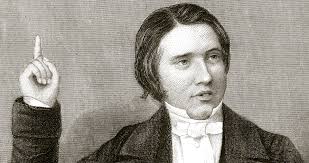Your weekly Dose of Spurgeon
The PyroManiacs devote some space each weekend to highlights from the lifetime of works from the Prince of Preachers, Charles Haddon Spurgeon. The following excerpt is from The Metropolitan Tabernacle Pulpit, volume 48, sermon number 2,796, "A man of God alone with God."

"Can each one of us
now say, in this sense, 'I have declared my ways' to the Lord? For this
should be done, not only at our first coming to him, but continually
throughout the whole of our life."
We should look over each day, and sum up the
errors of the day, and say, “I have declared my ways,’—my naughty ways, my
wicked ways, my wandering ways, my backsliding ways, my
cold, indifferent ways, my proud ways;—the way of my words, the way
of my thoughts, the way of my imagination, the way of my memory, for it
has a treacherous way of remembering evil and forgetting good;—the way of my actions towards thee, my God, and there is much to
regret there; the way of my actions in my family, in the world, and in the
church.”
What a sorrowful stock-taking each day would be to many professors
if they were honest to themselves and to their God! Even those who “walk
in the light, as God is in the light,” and have the closest fellowship
with him, yet know that it is a very sweet and blessed thing even for them
that “the blood of Jesus Christ his Son cleanseth us from all sin;”
for even they still sin, and it is necessary for each one of them to say continually,
“I have declared my ways.”
Do you try to hide
your sin, dear friend? It is useless for you to attempt to do so, for God ever
sees it. Why do you seek to conceal what is always before his eye?
Better far to confess it to him, that he may then cast it behind his back, and
remember it against you no more for ever.
I believe that, often, as
sinners confessing to God, we miss much true comfort for want of making a
clean breast of our transgressions. Yet the Lord knows what is in our heart
even though we do not own it. It has been well observed that, when
Moses tried to excuse himself to God for not wanting to go to deliver
Israel, he said that he was slow of speech, and God met that objection by
giving him Aaron his brother to speak for him; but the Lord, in his reply to
Moses, also said, “All the men are dead who sought thy life.”
Moses had
not said anything about that matter; but God knew that there was that
fear in his heart, so he put his finger on the sore place at once. It is well when
we can do that for ourselves; when, in our spirit, there is no guile;
when we come, as David did, in the 51st Psalm, and confess the very sin
which we have committed: “Deliver me from bloodguiltiness, O God,” calling it by
its right name, then is it that the soul begins to get peace
with God.
“But,” someone asks,
“are we, then, to confess to God every sin in detail?” No, that would be
impossible, and probably it would not even be useful; but there must be no
wish to conceal any sin from God. Such a desire would be a vain one,
for “all things are naked and opened unto the eyes of him with whom we have
to do.”
There must be an acknowledgment of the sins which we have
not yet seen in their full heinousness. Each of us will do well to offer David’s
prayer, “Cleanse thou me from secret faults.” If we have committed faults,
which are hidden even from ourselves, we desire to be delivered from
them so that they should not remain to our condemnation.











No comments:
Post a Comment